Adrian Collins's Blog, page 71
December 30, 2023
REVIEW: The Principle of Moments by Esmie Jikiemi-Pearson
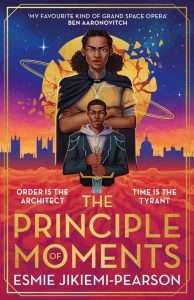 The Principle of Moments, the exuberant debut novel by Esmie Jikiemi-Pearson, is a time-traveling space opera and a homage to Regency-era romances.
The Principle of Moments, the exuberant debut novel by Esmie Jikiemi-Pearson, is a time-traveling space opera and a homage to Regency-era romances.
Esmie Jikiemi-Pearson fully embraces the Chosen One trope, using it to great effect in The Principle of Moments. The heroine of the story, Asha, is a fugitive engineer thousands of years in the future, long after humanity has destroyed Earth and colonized other planets. Asha is astonished to learn that she has a long-lost sister who has been captured by the emperor and imprisoned in an imperial jail. Asha’s quest to rescue her sister has dire consequences for the entire universe.
The second lead protagonist in The Principle of Moments is the time-traveling Obi, who was abandoned by his father at only eight years old. Obi’s story begins in 1812 in Regency-era London, centering on his relationship with Prince George, the fictitious son of Prince Regent (later King) George IV and grandson of King George III.
Prince George comes from a rather sorry line of monarchs. His grandfather, George III, is most noted for losing the American colonies, while his father, George IV, pursued a leisurely life of fiscal extravagance, without any true accomplishments to his name. Young Prince George finds himself lost, and unfortunately also shares his father’s addiction to laudanum. His greatest hope for meaning rests in his romance with Obi.
Kudos to Jikiemi-Pearson for making a queer, interracial relationship a focal point of the novel, especially one set in the early nineteenth century and across such a major class divide. I immediately connected with both Obi and George: their relationship is one of the highlights of the novel. There is also an element of suspense as the mysterious character named Alarick pursues Obi and the fragment of his soul that he left with George.
The Principle of Moments touches on a number of serious issues, including slavery, suicidal ideation, and substance abuse, but it doesn’t probe any of them in great depth. The tone of the book stays remarkably upbeat throughout, focusing on the fast-paced action and relationships among the various characters.
Although there are plenty of sci-fi elements to The Principle of Moments, this is primarily a relationship-driven novel. The relationships between Asha and Obi, Obi and George, and Asha and her sister are all wonderfully developed and kept me glued to the pages. While I immediately connected with Obi and George, the relationships involving Asha took a longer time to build. But the buildup is definitely worth it, as the story grows to an outstanding climax that leaves a big emotional impact on the reader.
I also enjoyed the epigraphs at the end (rather than the beginning) of each chapter. Many of these are quotes from the Archivist, a character who is more than meets the eye:
“Archivist’s Note: You must excuse my poetic license. Artistic liberty is something I am rarely afforded, and this tale begs to be transformed into scripture; everything about it is epic.”
Esmie Jikiemi-Pearson’s writing can only be described as jubilant. This is an author who clearly had the time of her life writing this novel. Her genuine excitement for the story pops off every page. Overall, The Principle of Moments is an ecstatic debut.
Read The Principle of Moments by Esmie Jikiemi-PearsonThe post REVIEW: The Principle of Moments by Esmie Jikiemi-Pearson appeared first on Grimdark Magazine.
December 29, 2023
REVIEW: The Death Doula by Ali Seay
The end is nigh in The Death Doula, the chilling new horror book by Ali Seay. Marki Hartwell is the eponymous death doula, a young woman who has found her vocation as someone who helps the dying while they cross over to the other side. Marki is summoned by hospice caretakers to comfort patients during their last moments, especially those without any close friends or family members.
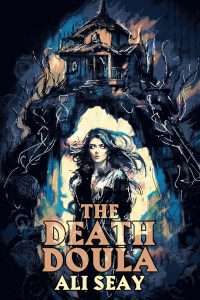 An occupation as morbid as death doula doesn’t lend itself to carefree dinner conversation. Marki’s girlfriend, Paula, can no longer stand this perpetual cloud of death casting a shadow over their relationship. Marki is devastated by the breakup but copes by throwing herself deeper into her work, bringing heartfelt care and compassion to each of her patients.
An occupation as morbid as death doula doesn’t lend itself to carefree dinner conversation. Marki’s girlfriend, Paula, can no longer stand this perpetual cloud of death casting a shadow over their relationship. Marki is devastated by the breakup but copes by throwing herself deeper into her work, bringing heartfelt care and compassion to each of her patients.
The main story of The Death Doula begins on a requisite dark and stormy night as Marki is called to guide a dying man, Franklin Singleton, into the great beyond. Franklin, or Lin for short, is in terrible condition, filthy and appearing much older than his seventy-eight years:
“Cloudy blue eyes rolled her way. He looked well past his reported seventy-eight years. He looked a hundred and eight, a thousand…he looked timeless and ancient.”
Although Lin warns Marki that she should leave his home to escape an unspeakable evil, it may already be too late for her:
“Not the devil, girl. He’s what waits under the devil’s bed. He’s what the devil has nightmares about. He’s the thing that reaches out for you when you are helpless, hopeless, and want to die. The thing that beckons you to jump off cliffs or run your wrist along the edge of a knife. He’s who grows fat with pain and hate and rage and bleakness.”
In addition to the present-day narrative, The Death Doula has flashback chapters for Lin to recount his backstory, including a deeply disturbed childhood with a father for whom “abusive” would be much too light of a word.
The pacing in The Death Doula is spot-on, with plenty of unexpected scares and nary a dull moment. Ali Seay’s crisp prose adeptly conveys the intensity of the story as it builds to its astonishing climax.
All in all, Ali Seay breathes new life into the familiar haunted house trope. The Death Doula is an expertly crafted tale of horror that left me guessing till the end. I am eager to read more from the very talented Ali Seay.
Read The Death Doula by Ali SeayThe post REVIEW: The Death Doula by Ali Seay appeared first on Grimdark Magazine.
December 28, 2023
Rising Stars of Dark and Grimdark SFF 2024
Here at Grimdark Magazine we love to discover new authors who whet our appetite for the darker side of science fiction and fantasy (SFF). Esmay Rosalyne, CT Phipps, and I have assembled Grimdark Magazine’s second annual list of Rising Stars in Dark and Grimdark SFF. The goal of this list is to highlight and recognize early career authors who have published some of the most exciting new dark and grimdark SFF novels over the past year. A list of the previous year’s winners can be found here.
P.L. Stuart, Author of A Drowned Kingdom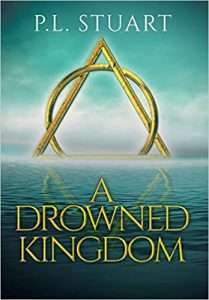 Submerge yourself in the majesty of P.L. Stuart’s masterful debut novel, A Drowned Kingdom, a fantasy inspired by the mythology of Atlantis. A Drowned Kingdom asks the question: when the most powerful country in the world is swallowed by the sea, can a new kingdom rise again?
Submerge yourself in the majesty of P.L. Stuart’s masterful debut novel, A Drowned Kingdom, a fantasy inspired by the mythology of Atlantis. A Drowned Kingdom asks the question: when the most powerful country in the world is swallowed by the sea, can a new kingdom rise again?
A Drowned Kingdom is told as a first-person narrative by Othrun, the Second Prince of Atalantyx and half-brother of First Prince Erthal, heir to the kingdom. P.L. Stuart’s decision to employ single-perspective first-person narration works very effectively, although it is often discomforting being stuck inside the head of a despicable character such as Othrun.
Being inside Othrun’s head creates a morality distortion field on par with some of the greatest grimdark protagonists. But P.L. Stuart’s approach is also unique with the deeply religious influences on Othrun’s reasoning. Othrun’s belief in the Atalantean religion with its one true God seems genuine, but there are moments when his religious fervor may cross over into delirium. Othrun’s faith-based explanations for major events in the novel push him further into zealotry. P.L. Stuart has done a marvelous job plumbing the depths of Othrun’s psychology as he justifies treachery and sets himself on a path toward possible tyranny.
Read the full review here. Also check out our reviews of The Last of the Atalanteans and Lord and King, the second and third books of The Drowned Kingdom Saga.
AUTHOR BIOP.L. Stuart lives in Chatham, Ontario, with his wife, Debbie. A Drowned Kingdom is the first novel in The Drowned Kingdom Saga.
Lavanya Lakshminarayan, Author of The Ten Percent Thief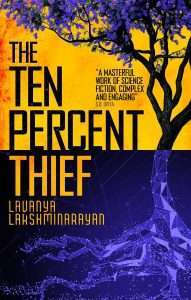 In The Ten Percent Thief, Lavanya Lakshminarayan immerses us in Apex City, formerly known as Bangalore, once the Silicon Valley of India and now governed by a technocapitalist meritocracy. The Big Brother of the tale is Bell Corp, a corporation that has created its own technocratic caste system by ranking individuals on its signature bell curve. Individual productivity and the virality of social media posts help to improve one’s score, propelling them toward the upper tail of the bell curve. But it’s not enough to reach the top percentile: citizens must continually strive toward perfection to maintain this privileged ranking. Bell Corp has a zero-tolerance policy toward failure: anything less than perfection is unacceptable.
In The Ten Percent Thief, Lavanya Lakshminarayan immerses us in Apex City, formerly known as Bangalore, once the Silicon Valley of India and now governed by a technocapitalist meritocracy. The Big Brother of the tale is Bell Corp, a corporation that has created its own technocratic caste system by ranking individuals on its signature bell curve. Individual productivity and the virality of social media posts help to improve one’s score, propelling them toward the upper tail of the bell curve. But it’s not enough to reach the top percentile: citizens must continually strive toward perfection to maintain this privileged ranking. Bell Corp has a zero-tolerance policy toward failure: anything less than perfection is unacceptable.
The Ten Percent Thief shines because of Lavanya Lakshminarayan’s finely honed prose. Lakshminarayan succeeds in establishing emotional connections to the rotating cast of characters in each chapter, while providing a broader view of Apex City society. The Ten Percent Thief is a deeply thought-provoking and timely novel that updates the traditional notion of castes for a near-future meritocratic society infused with artificial intelligence.
Read the full review here.
AUTHOR BIOLavanya Lakshminarayan is a Locus Award finalist and is the first science fiction writer to win the Times of India AutHer Award and the Valley of Words Award, both prestigious literary awards in India, and her work has been longlisted for a BSFA Award. She’s occasionally a game designer and has built worlds for Zynga Inc.’s FarmVille franchise, Mafia Wars, and other games. She lives in India and is currently working on her next novel.
John Palladino, Author of Buzzard’s Bowl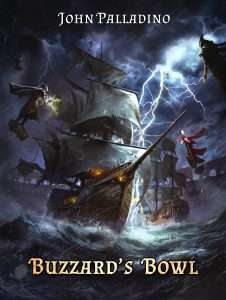 John Palladino takes his craft to new heights in Buzzard’s Bowl, the second volume of his grimdark fantasy series, The Tragedy of Cedain. I am delighted to see how Palladino has grown as a writer since publishing his first novel, The Trials of Ashmount. Palladino already showed great promise with his debut, and he has made all the right moves with Buzzard’s Bowl.
John Palladino takes his craft to new heights in Buzzard’s Bowl, the second volume of his grimdark fantasy series, The Tragedy of Cedain. I am delighted to see how Palladino has grown as a writer since publishing his first novel, The Trials of Ashmount. Palladino already showed great promise with his debut, and he has made all the right moves with Buzzard’s Bowl.
Buzzard’s Bowl is fast-paced and full of surprises for each of the main characters, especially when their storylines converge. Palladino shines in writing pulse-pounding action sequences. My favorite is the scene captured on the outstanding cover designed by Dusan Markovic, which depicts a flooded Buzzard’s Bowl arena with battling gladiator ships electrified by levitating Magicai wizards. This is one of several epic action sequences in the book.
John Palladino gleefully embraces the best of grimdark fantasy in Buzzard’s Bowl, which reads in many ways like an irreverent version of A Game of Thrones. Palladino shares Joe Abercombie’s talent at developing broken, morally complex characters, George R.R. Martin’s epic worldbuilding and well-paced story arcs, Scott Lynch’s incisive humor, and the raw emotional impact of Anna Smith Spark. Buzzard’s Bowl firmly establishes John Palladino as one of the most exciting new voices in the grimdark fantasy community.
Read the full review here.
AUTHOR BIOYou’ve stumbled upon somebody who takes nothing seriously, not even author bios. It’d be a good guess to say John Palladino was born in 1988, lives in Avoca, New York, has a bachelor’s degree in business management, and enjoys hibernating at home while writing. He might also lie and say he enjoys pets, long walks on the beach, and his hobbies include happiness and scuba diving. You’d see right through those lies, however, and notice he prefers the simpler things in life—reading, video games, and making ill-timed jokes. John also dislikes taking care of anything that excretes substances.
H.C. Newell, Author of Curse of the Fallen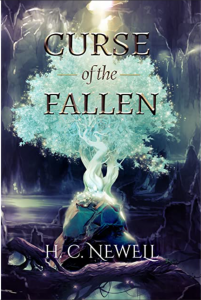 H.C. Newell has put a grimdark twist on classic Tolkienesque fantasy with Curse of the Fallen, the first volume of her Fallen Light series. The heroine of the story, Neer, is a young woman cursed with forbidden magical powers in the land of Laeroth. Neer’s magical abilities make her a target of the Order of Saro, a religious faction who rule the human-controlled territories and have outlawed magic. Neer will stop at nothing to break this curse and begin a new life free of fear.
H.C. Newell has put a grimdark twist on classic Tolkienesque fantasy with Curse of the Fallen, the first volume of her Fallen Light series. The heroine of the story, Neer, is a young woman cursed with forbidden magical powers in the land of Laeroth. Neer’s magical abilities make her a target of the Order of Saro, a religious faction who rule the human-controlled territories and have outlawed magic. Neer will stop at nothing to break this curse and begin a new life free of fear.
H.C. Newell’s writing is the perfect match for her dark tale. Newell is a natural storyteller, and reading Curse of the Fallen feels like listening to a haunting story over a slowly dying bonfire, waiting for creatures to jump at you out of the darkness. With Curse of the Fallen, H.C. Newell has crafted a delightfully dark adventure and established herself as a rising star of grimdark fantasy.
Read the full review of Curse of the Fallen here. Also check out our reviews of the next two books of the Fallen Light series, The Forbidden Realms and Shadows of Nyn’Dira, as well as her novella, The Banished.
AUTHOR BIOH.C. Newell is an American author of dark epic fantasy. Newell began her writing journey at a young age. In elementary school, she would often write small plays for her and her cousins to perform. In middle and high school her love of writing transformed into fiction literature, which she would write in spiral-bound notebooks. By 2015, she had written more than 5 romance and young adult novels and several short stories.
In 2014, Newell started her first novel series, Forthwind, which was a young adult trilogy. As she grew as an author, she found her niche in adult fantasy, and created the Fallen Light universe. This six-part novel series took Newell over seven years to create. She published her debut novel Curse of the Fallen in April 2021.
Newell’s works have been compared by readers to authors such as J.R.R. Tolkien, Brandon Sanderson, Andrejz Sapkowski, and Robert Jordan among others.
E.J. Doble, Author of The Fangs of War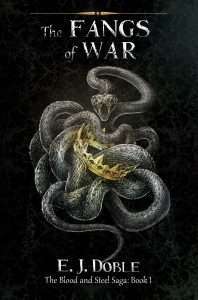 The Fangs of War is a high stakes and gritty military fantasy full of dark and broken characters, cutthroat political intrigue, meddling gods, eldritch monsters, and the best type of emotional turmoil!
The Fangs of War is a high stakes and gritty military fantasy full of dark and broken characters, cutthroat political intrigue, meddling gods, eldritch monsters, and the best type of emotional turmoil!
The roving forces of Tarraz have brutally executed the King of Provenci, paving the way for a new and brutal military government to launch into power. Commander Alvaraz is dead-set on razing Tarraz to the ground and has built up the largest army seen in a generation. The two nations are plunged into a catastrophic war, which is quickly revealed to be a conflict not only of men, but also one of the divine.
If you like the sound of a slow-burn yet action-packed multi-POV grimdark fantasy with complex characters, lyrical writing, emotionally engaging twists and turns, and a dash of (metaphysical) horror thrown in, then please do yourself a favor and check out The Fangs of War. It is perfect for fans of Joe Abercrombie, Richard Nell, Michael Michel, R.J. Barker and Anthony Ryan.
Read Esmay’s full review here.
AUTHOR BIOE.J. Doble is twenty-one years old and from Bath, UK. He is a self-published author, whose first novel, The Fangs of War, was released in January 2022. He is a part-time swim teacher and painter.
When not writing, he is most often found drinking excess amounts of coffee and tending to a variety of houseplants with odd and entirely pointless names.
David Hambling, Author and Editor of Eldritch Prisoners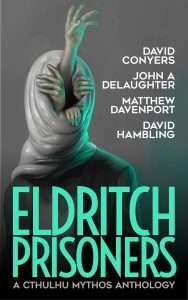 The Cthulhu Mythos continues to be something that produces new material every year. Despite H.P. Lovecraft’s xenophobic views, many new authors have taken up his work in bold and new directions as the focus on cosmic horror as well as an alienating universe hostile to humanity by its very existence is a timeliness creation. Eldritch Prisoners is an anthology of which David Hambling is both the primary author of and editors. It deals with body snatchers, alien prisoners, and a crushing sense of loss. He’s selected authors who have created some truly spine-tingling and fascinating stories from.
The Cthulhu Mythos continues to be something that produces new material every year. Despite H.P. Lovecraft’s xenophobic views, many new authors have taken up his work in bold and new directions as the focus on cosmic horror as well as an alienating universe hostile to humanity by its very existence is a timeliness creation. Eldritch Prisoners is an anthology of which David Hambling is both the primary author of and editors. It deals with body snatchers, alien prisoners, and a crushing sense of loss. He’s selected authors who have created some truly spine-tingling and fascinating stories from.
Read CT’s review here.
AUTHOR BIODavid Hambling is a journalist and author based in Norwood, South London. His fiction, starting with a collection, The Dulwich Horror & Others, explores the Cthulhu mythos in his own locale. His novels include the popular Harry Stubbs adventures, also set in the 1920s, and he has previously contributed to ST Joshi’s Black Wings of Cthulhu collections.
P.J. Nwosu, Author of Dream of Death City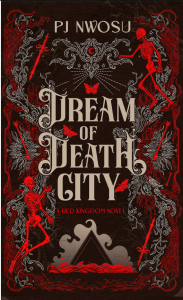 Dream of Death City is the debut adult novel by author PJ Nwosu. It is an excellent read, and the first instalment in the new Red Kingdom series. Although there are no other full-size novels, Nwosu has two novellas in the same world available for free.
Dream of Death City is the debut adult novel by author PJ Nwosu. It is an excellent read, and the first instalment in the new Red Kingdom series. Although there are no other full-size novels, Nwosu has two novellas in the same world available for free.
Dream of Death City blends dark fantasy with a decent detective fiction plot and would be the perfect novel for fans of Richard Swan’s Justice of Kings because it is set in a more historical, low-magic world. Still, anyone who likes darker fantasy detective stories would enjoy their time spent with Dream of Death City.
Read the full review here.
AUTHOR BIOP.J. Nwosu writes dark mysteries in epic fantasy worlds. She loves reading gritty detective and fantasy novels, and is obsessed with learning about strange, creepy tales from history.
P.J. Nwosu tells twisty, dark stories against epic fantasy backdrops, and loves all things memento mori. She lives by the sea in Australia with her husband and black cat.
Tori Tecken, Author of The Blood Stones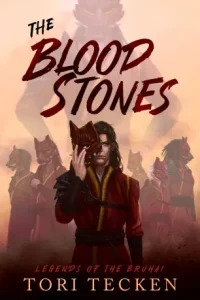 Tori Tecken pours a lifetime’s love of fantasy into The Blood Stones, the masterfully written first volume of her new dark epic fantasy series, Legends of the Bruhai. The novel opens with Gehrin, a young boy who, against his father’s wishes, witnesses the execution of a man sentenced to death for murder of the prince. The condemned man is officially nameless, a traitor meant to be forgotten in the annals of history. However, the piercing gaze of the dying man leaves an undying impression on Gehrin. The Blood Stones excels in its portrayal of mental health struggles, especially related to issues of identity.
Tori Tecken pours a lifetime’s love of fantasy into The Blood Stones, the masterfully written first volume of her new dark epic fantasy series, Legends of the Bruhai. The novel opens with Gehrin, a young boy who, against his father’s wishes, witnesses the execution of a man sentenced to death for murder of the prince. The condemned man is officially nameless, a traitor meant to be forgotten in the annals of history. However, the piercing gaze of the dying man leaves an undying impression on Gehrin. The Blood Stones excels in its portrayal of mental health struggles, especially related to issues of identity.
The Blood Stones is epic fantasy par excellence, Tori Tecken’s love letter to the genre and a tour de force of worldbuilding and character development that will capture your imagination from the first page and keep you guessing till the very end.
Read the full review here.
AUTHOR BIOWhen Tori Tecken was a little sprout her epic fantasy storytelling involved small pirate and animal figurines invading Lego cities. Inspired early on by the powerful storytelling of writers like Jack London, C.S. Lewis, and Brian Jacques, Tori was obsessed with characters she couldn’t get out of her head and the possibility of worlds undiscovered.
After writing a few books, she became a self-published author at age 14. After teaching at Young Writers’ Conferences and conventions for a few years, she went to college. She married the weirdest boy she’d ever met. They now have three small humans of their own who are just as weird as they are, but much more wonderful.
Today, Tori is a wife and a stay-at-home mom, but still a storyteller. She writes beneath the supervision of two feline overlords in a chair that is older than she is. And she wouldn’t have it any other way.
Philip Chase, Author of The Way of Edan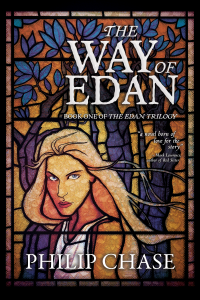 Every word is worth savoring in The Way of Edan, the masterful debut epic fantasy from Philip Chase and the first volume in his Edan Trilogy.
Every word is worth savoring in The Way of Edan, the masterful debut epic fantasy from Philip Chase and the first volume in his Edan Trilogy.
The Way of Edan is surprisingly dark. Chase grabbed my attention from the opening prologue, giving realistic depictions of religious zealotry and violence. There are also a number of truly terrifying creatures dwelling in Eormenlond. Chase maintains an even pacing throughout the novel, introducing characters and worldbuilding in a natural fashion. I felt fully immersed in the story without ever becoming lost or confused, despite the complexity of the world and its large cast of characters. Grimdark fans will appreciate the gray morality embodied by several of the characters, in addition to those who appear objectively good or evil.
The Way of Edan strikes the perfect balance between modern and classic epic fantasy. Philip Chase manifests his deep love of literature in The Way of Edan, a lamentation that distills the best of fantasy from classics, such as Beowulf and The Lord of the Rings, through modern masterpieces like The Name of the Wind.
Read the full review here. Also check out our reviews of The Prophet of Edan and Return to Edan, the second and third books of The Edan Trilogy.
AUTHOR BIOA medievalist with a Ph.D. in English Literature, Philip Chase has taught courses on writing, medieval literature, and fantasy literature, among other things. His special interests include Old English, Old Norse, Middle English, nineteenth-century medievalism, comparative mythology, and fantasy. Other inspirations include time spent in places like Germany, the United Kingdom, Nepal, and the Northeast and Northwest of the United States. His YouTube channel, “Philip Chase,” is dedicated to exploring fantasy literature, which is full of stories that reflect the full array of human experience and thus are worthy of critical exploration.
The post Rising Stars of Dark and Grimdark SFF 2024 appeared first on Grimdark Magazine.
December 27, 2023
The most anticipated TV shows and movies for 2024
Last Updated on December 28, 2023
2023 was another thrilling year in TV and film for fans who enjoy the darker side of stories. Whether you took a trip to the cinema, streamed your favourite show at home, or even went out and bought a physical copy of your latest fix (remember having to do that?), there was a wide variety of brilliance in the darker realm of media. The year started with a bang with HBO’s The Last of Us setting the standard in video game adaptations. The Boys continued its disgusting excellence joined by spin-off Gen V, Mike Flanagan created yet another piece of greatness in his adaptation of Poe’s The Fall of the House of Usher, and the year finished with another stunning animated show from Netflix with Blue Eye Samurai coming out of nowhere and amazing audiences. We had all that and more with Silo, Alice in Borderland, The Wheel of Time S2, and The Last Kingdom: Seven Kings Must Die all scratching that grimdark itch.
2024 can’t top that, can it? Only time will tell, but here’s my most anticipated TV shows and movies for 2024 as we welcome in a new year.
FalloutBased on the hugely popular videogame, Fallout is looking to be 2024’s version of The Last of Us. In a post-apocalyptic LA, citizens live in underground bunkers following nuclear decimation. There’s mutants, bandits, and more from this series that will be released in April and from what we have seen so far, this is looking like a faithful adaptation of the game so fans will be salivating for the chance to enter this world filled with radiation and brutality!
Alien: RomulusNot much is known so far about the latest dip into the world of the terrifying xenomorph. Apparently, this was due to be a TV release before strong early viewings forced producers to give it a summer theatrical release. Hopefully they have learnt from the success of the brilliant Prey set in the Predator universe and will attempt to keep the core of the brilliance of the original films whilst bringing something fresh for an audience ready to be terrified once again.
3 Body ProblemFrom the creators of Game of Thrones, a fateful decision in the 1960’s echoes across space and time to present day, forcing scientist to face humanity’s greatest threat. Based on the Hugo award winning novel by Liu Cixin (called China’s Arthur C. Clarke), this sci-fi series full of intrigue and adventure has huge potential and we’ll be able to watch the first episode when it drops in March.
House of the Dragon S2House of the Dragon S1 was an absolute delight thanks to its tight story, great cast (Matt Smith, perfect.) and stunning use of dragons. Learning from the mistakes made in the final seasons of Game of Thrones, it brought viewers back to the world of Westeros and it was like we had never left. The battle for the Targaryean throne continues and in House of the Dragon S2, it is time to see more of that fire and blood as dragons wage war and families and friends are torn apart forever. This will be a bloody treat.
NosferatuThis gothic tale is written and directed by Robert Eggers (The Norseman, The Witch). With an excellent cast (Bill Skarsgard, Emma Corrin, Willem Defoe, Nicholas Hoult), this latest version of the vampire tale linked with Dracula will no doubt bring the visceral brutality and horror that the director is best known for. Be ready to be scared when this hits the big screen at the end of the year.
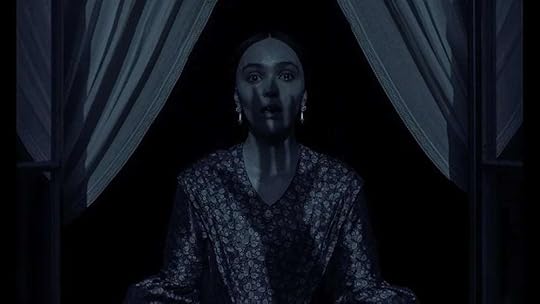
Set before George Miller’s Mad Max (2015), this prequel tale tells the story of Furiosa before she met Max in what many view as one of the greatest action movies of all time. The world looks just as beautiful and dangerous as ever and in the hands of the genius of Miller, this film will be nothing but an absolute delight for fans as we return to the wasteland.
Kingdom of the Planet of the ApesThe most recent Planet of the Apes delivered three increasingly dark films as we were able to witness the fall of humanity and the rise of the apes, all with stunning CGI and a wonderful performance by Andy Serkis as Caesar. This latest offering looks to continue that tale 300 years later as Caesar’s teachings are twisted and the divide between humans and apes is greater than ever. But through the darkness, there is hope as a young chimpanzee befriends a human.
Dune: Part 2Dune was an absolute masterpiece. Denis Villeneuve knows what he’s doing when it comes to making beautiful, grim, sci-fi films (The Arrival, Blade Runner 2049) and Dune: Part 2 looks as though he will be continuing that journey with a stellar returning cast (Timothee Chalamet, Rebecca Ferguson, Jason Mamoa) and new additions such as Florence Pugh. Paul Atreides with Chani and the Fremen as he seeks revenge for those who destroyed his family. You won’t want to miss this on the big screen.
A Quiet Place: Day OneA Quiet Place arrived on cinema screens in 2018 rather appropriately, quietly but with a huge impact. The horror has spawned one sequel already and this year sees a prequel released set around day one in the post-apocalyptic world as the terrifying creatures arrive on Earth and destroy all in their path. There’s high expectations for this horror following two brilliant films in the series so far.
BorderlandsBased on a popular videogame and directed by Eli Roth (Inglorious Basterds, Hostel), this film follows a bunch of misfits on the fictional planet of Pandora as they search for a mysterious relic. If this film is as wild and fun as the game, there’s a strong chance of it being a favourite in 2024.

So we have a lot to look forward to in 2024 and that’s just the tip of the iceberg. There’s bound to be more news on the Henry Cavill led Amazon Warhammer series (please be good), Best Served Cold written by Joe Abercrombie (how can this not be good?), and Lord of the Rings: War of the Rohirrim, as well as the latest seasons of The Wheel of Time, The Lord of the Rings: The Rings of Power, Silo, Arcane, and Blue Eye Samurai. If you’re a dark SFF and /or grimdark fan, 2024 is looking bright.
The post The most anticipated TV shows and movies for 2024 appeared first on Grimdark Magazine.
REVIEW: Conan the Barbarian #6 by Jim Zub (W) and Doug Braithwaite (A)
Last Updated on December 28, 2023
Titan Comics’ Conan the Barbarian issue 6 opens immediately after the previous issue left off. Conan and the Gloryhounds—the overambitious band of thieves Conan is effectively babysitting—have succeeded in getting their hands on Tarim’s Touch, only to discover that careless handling of the black stone relic has unleashed a trio of ravening spectral guardians. Trapped between an incorporeal threat and a temple swarming with alerted Bel worshipers, Conan and the thieves must battle their way to freedom.
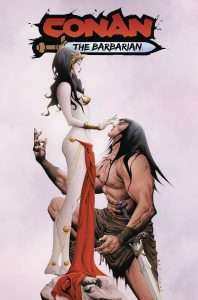 Despite the considerable gap in time and geographical distance between the current events and those of Conan the Barbarian issues 1-4, in “Thrice Marked for Death! Part II: Cursed” writer Jim Zub makes plain the connections to the previous “Bound in Black Stone” story arc. It’s confirmed that Tarim’s Touch is composed of the same supernaturally infused black stone that had such a malevolent effect on the Cimmerian countryside, and the specters that escaped from the relic follow the same dark tentacled god that Conan faced off against in his homeland. In the Marvel Comics and Dark Horse versions of the Conan the Barbarian comic, even the longest plotlines were generally neatly confined to a single arc of about five or six issues, so it’s interesting to see Zub attempt some longer-form storytelling in the Titan Comics incarnation. Conan’s adventures aren’t necessarily desperately crying out for ongoing continuity, but I’m not opposed to its introduction.
Despite the considerable gap in time and geographical distance between the current events and those of Conan the Barbarian issues 1-4, in “Thrice Marked for Death! Part II: Cursed” writer Jim Zub makes plain the connections to the previous “Bound in Black Stone” story arc. It’s confirmed that Tarim’s Touch is composed of the same supernaturally infused black stone that had such a malevolent effect on the Cimmerian countryside, and the specters that escaped from the relic follow the same dark tentacled god that Conan faced off against in his homeland. In the Marvel Comics and Dark Horse versions of the Conan the Barbarian comic, even the longest plotlines were generally neatly confined to a single arc of about five or six issues, so it’s interesting to see Zub attempt some longer-form storytelling in the Titan Comics incarnation. Conan’s adventures aren’t necessarily desperately crying out for ongoing continuity, but I’m not opposed to its introduction.
As hoped, Conan’s slain pirate queen Bêlit (originally appearing in Robert E. Howard’s 1934 Weird Tales story “Queen of the Black Coast”) makes another appearance through flashbacks. In the previous issue, the tragic loss of Bêlit is used to explain Conan’s current state of nihilistic dissolution, but here it highlights that Conan already has some experience with spirits and the afterlife, even before encountering the specters from the black stone. Where Bêlit’s fierce love allowed her soul to briefly return from the realm of the dead and save Conan’s life at the climax of “Queen of the Black Coast” (also a scene adapted and given to Valeria in the 1982 Conan the Barbarian film), now he faces spirits resurrected to kill again in their master’s name. As a fan of the original Howard stories, I appreciate seeing the events of the classic tales incorporated into newer adventures in this way. However, I suspect that newcomers unfamiliar with the “Queen of the Black Coast” short story or its previous comic adaptations may not be getting the full effect of the Bêlit flashbacks.
The artwork continues to appeal. Diego Rodriguez does some excellent work with the color in this issue. After so many sepia-toned scenes lit by torch and lantern-light in the previous issue, the unearthly green glow of the specters has real impact. In terms of the line artwork, I still think Doug Braithwaite makes Conan’s face too lined for this early stage in his life, but that can be explained away as the Cimmerian’s lack of access to sunscreen. On a more positive note, Braithwaite shows him wearing the classic disc-shaped necklace from the earliest issues of Marvel’s 1970s Conan the Barbarian, a fun visual throwback to Barry Windsor-Smith’s depiction of the character.
Conan the Barbarian issue 6 answers some questions while raising several more. I’m excited to learn more about the black stone and its ghostly servants, and I hope to continue to see Conan’s past with Bêlit influence his current adventure.
Read Conan the Barbarian #6 by Jim Zub (W) and Doug Braithwaite (A)The post REVIEW: Conan the Barbarian #6 by Jim Zub (W) and Doug Braithwaite (A) appeared first on Grimdark Magazine.
December 26, 2023
REVIEW: Exordia by Seth Dickinson
Exordia—Seth Dickinson’s latest offering to the SF/F gods—begins not with a bang, or a whimper. Instead, it begins with a Michael Crichton quote.
“The most likely consequence of contact is absolute terror.”
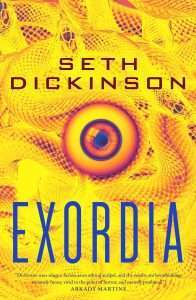 Once you flip through the opening chapters, however, you might start thinking that absolute terror is an odd description of Exordia. Indeed, it begins in a sitcom-esque manner—Anna Sinjari, Kurdish refugee and socially struggling New Yorker, ends up meeting a serpentine alien called Ssrin. Together, they learn about the human experience, with Ssrin watching the likes of Neon Genesis Evangelion to figure us out, and Anna wrapping her mind around suitably alien concepts like serendure, the bond that pulls together two beings; the same one that ties Anna and Ssrin together.
Once you flip through the opening chapters, however, you might start thinking that absolute terror is an odd description of Exordia. Indeed, it begins in a sitcom-esque manner—Anna Sinjari, Kurdish refugee and socially struggling New Yorker, ends up meeting a serpentine alien called Ssrin. Together, they learn about the human experience, with Ssrin watching the likes of Neon Genesis Evangelion to figure us out, and Anna wrapping her mind around suitably alien concepts like serendure, the bond that pulls together two beings; the same one that ties Anna and Ssrin together.
Those chapters are mere illusion; sitcom quickly gives way to existential dread as a world-spanning EMP launched by an alien invasion cripples communications and tech, along with the discovery of an alien object (designated Blackbird) within Kurdistan, precisely where Anna was born… making her a prime recruit for a US task force dispatched to investigate said object.
This investigation of Blackbird is the main driver of the story, as it inflicts untold-of horrors upon researchers working on borrowed time to figure out its secrets. It doesn’t disappoint. There are excellent portrayals of the New Weird, from mathematical alien geometries, to delightful confectioneries of body horror that feel Annihilation-esque, and yet entirely original in its method to invoke horror and disgust in the reader, to dread what the unknown might do to you.
Exordia saves its best, however, when it flips the script around, back to humanity and confronts us with our own predilections—in this case, the tendency to resort to violence as a solution, first in US foreign policy and its aftereffects on Kurdistan, but also in the reflection of alien life. In many ways, our unseen antagonists can be described as a kind of imperialist, invading state, a futuristic American invasion (something Dickinson is familiar with, from their Masquerade novels).
“We are all flawed and he knows our flaws! Only God can save us from Satan. You and I, can we be blamed for not saving ourselves?”
And speaking of humanity, perhaps the most interesting dynamic can be found in two of Exordia’s characters: Erik Wygaunt and Clayton Hunt. Erik’s need to do right regardless of the end result, vs. Clayton’s need to win at all costs (with Anna injecting a hard dose of reality into their push-and-pull dynamic) is a recurring conflict throughout the book, and no less compelling for it. Is nuclear bombardment of civilians an acceptable casualty when humanity itself is at stake? Are honorable ideals worth sticking to when the end result is total, absolute annihilation? Dickinson treats these dilemmas with the weight and gravity they deserve; if the body horror, the weirdness, the sense of dread in Exordia is the meat of the story, those trolley problems prove to be the skeleton around which they’re framed.
If there’s anything to criticize, it’s really in how thoroughly Seth Dickinson has crafted Exordia. From start to finish, it feels like every word, every term, every scientific theory was deliberately, meticulously put into place, like the concept of pink noise that’s discussed during the study of Blackbird. But it’s those theories that also become something of a distracting noise; it’s easy to get lost in all the scientific jargon that it can feel like you’re missing out on the point of the story, the why am I reading this factor—that tension from first contact, from Anna’s choices, and that of the conflict between Erik and Clayton, and how it ultimately affects the world.
Would I recommend this? Without a doubt. I think for fans of science fiction that crave substance, depth and something to ponder over the next few days, this is absolutely one to read. I’ve found that Seth Dickinson rarely creates an easy, gentle narrative experience, but every time I’ve picked up a book of theirs, it has invariably left me feeling the journey was worthwhile—and Exordia is no different.
Read Exordia by Seth DickinsonThe post REVIEW: Exordia by Seth Dickinson appeared first on Grimdark Magazine.
December 25, 2023
The Most Anticipated Dark Fantasy and Sci Fi Books of 2024
Last Updated on December 27, 2023
2023 brought in a good haul of dark fantasy and science fiction books with many of our favorite authors dominating the scene with their releases (check out our favourites from 2023). As 2024 creeps up, the party isn’t slowing down. Be in the know as the GdM team rallied together to discuss the books we are most excited for. It is time to break out the good ol’ TBR list for GdM’s most anticipated SFF books for 2024.
Empire of the Damned by Jay KristoffPicked by Fiona Denton
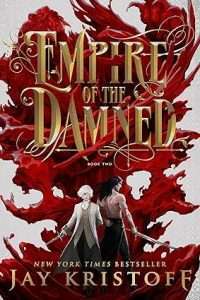 Readers with a long memory may recall that this sequel to 2021s Empire of the Vampire was also my pick for 2023 when I was desperately hoping the then untitled novel would be released in late 2023. I was wrong and I’m still waiting, but that’s okay. Absence makes the heart grow fonder, good things come to those who wait, etcetera etcetera. Empire of the Damned will have vampires, silversaints, the best sweary insults, battles, blood, and probably the odd potato vodka. I’ve got it on predordered in physical and audio (narrated by the awesome Damian Lynch) and I cannot wait to get my hands on it. After all, ‘a life without books is a life not lived’.
Readers with a long memory may recall that this sequel to 2021s Empire of the Vampire was also my pick for 2023 when I was desperately hoping the then untitled novel would be released in late 2023. I was wrong and I’m still waiting, but that’s okay. Absence makes the heart grow fonder, good things come to those who wait, etcetera etcetera. Empire of the Damned will have vampires, silversaints, the best sweary insults, battles, blood, and probably the odd potato vodka. I’ve got it on predordered in physical and audio (narrated by the awesome Damian Lynch) and I cannot wait to get my hands on it. After all, ‘a life without books is a life not lived’.
From holy cup comes holy light;
The faithful hands sets world aright.
And in the Seven Martyrs’ sight,
Mere man shall end this endless night.
Gabriel de León has saved the Holy Grail from death, but his chance to end the endless night is lost. Drawn into an uneasy alliance with the mysterious vampire Liathe, Gabriel must now deliver the Grail to ancients of the Blood Esani, and learn the truth of how Daysdeath might be finally undone.
But the Last Silversaint faces peril, within and without. Pursued by terrors of the Blood Voss, drawn into warfare between the Blood Dyvok and duskdancers of the frozen Highlands, and ravaged by his own rising bloodlust, Gabriel may not survive to see the Grail learn her truth.
And that truth may be too awful for any to imagine.
Read Empire of the Damned by Jay KristoffThe End and the Death: Volume III by Dan AbenettPicked by Chris Napper
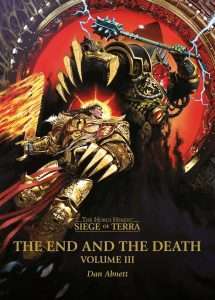 The End and the Death Part 1 was so nearly my book of the year, but let’s be honest it’s all about the final climax. The End and the Death part 3 is a book I’ve been looking forward to since I was first exposed to Warhammer 40k 33 or so years ago, with the full version of the Emperor vs Horus now added to by all the themes and threads added by the Horus Heresy series over 63 books and 17 years. Dan Abnett is rightly considered as one of if not the best writer in Black Library’s stable and I trust him to stick the landing.
The End and the Death Part 1 was so nearly my book of the year, but let’s be honest it’s all about the final climax. The End and the Death part 3 is a book I’ve been looking forward to since I was first exposed to Warhammer 40k 33 or so years ago, with the full version of the Emperor vs Horus now added to by all the themes and threads added by the Horus Heresy series over 63 books and 17 years. Dan Abnett is rightly considered as one of if not the best writer in Black Library’s stable and I trust him to stick the landing.
The Great Angel, Sanguinius, lies slain at his brother’s hand.
Terra burns as reality itself unravels and the greatest bastion of civilisation teeters on the brink of annihilation.
Desperate defenders gather, banding against the rabid traitor hordes. The Hollow Mountain, host to the pilgrims of Euphrati Keeler, is one of the last redoubts, held by the Dark Angels while the unclean host of Typhus lays siege. Malcador the Sigillite sits ablaze on the Golden Throne, trying to buy his master more time. But time is running out…
Guilliman races across the stars to reinforce the Throneworld. Will he return to ashes, where a Warmaster of Chaos has ascended to godhood, or will the Emperor have triumphed? And at what cost?
It all comes down to one final, climactic confrontation: the Emperor versus Horus. The father against the son.
Read The End and the Death: Volume III by Dan AbenettGhost Station by S.A BarnesEditor’s Pick
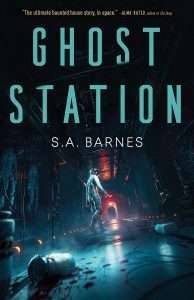 S.A Barnes filled the night sky with haunted delusions in Dead Silence. She reaches a new height with her latest space horror novel. While Dead Silence focused on a mysterious lost spaceship, the secrets in Ghost Station are spread throughout a planet. Space exploration is paved by nightmares in Ghost Station. Perhaps space isn’t so empty after all.
S.A Barnes filled the night sky with haunted delusions in Dead Silence. She reaches a new height with her latest space horror novel. While Dead Silence focused on a mysterious lost spaceship, the secrets in Ghost Station are spread throughout a planet. Space exploration is paved by nightmares in Ghost Station. Perhaps space isn’t so empty after all.
Space exploration can be lonely and isolating.
Psychologist Dr. Ophelia Bray has dedicated her life to the study and prevention of ERS—a space-based condition most famous for a case that resulted in the brutal murders of twenty-nine people. When she’s assigned to a small exploration crew, she’s eager to make a difference. But as they begin to establish residency on an abandoned planet, it becomes clear that crew is hiding something.
While Ophelia focuses on her new role, her crewmates are far more interested in investigating the eerie, ancient planet and unraveling the mystery behind the previous colonizer’s hasty departure than opening up to her.
That is, until their pilot is discovered gruesomely murdered. Is this Ophelia’s worst nightmare starting—a wave of violence and mental deterioration from ERS? Or is it something more sinister?
Terrified that history will repeat itself, Ophelia and the crew must work together to figure out what’s happening. But trust is hard to come by…and the crew isn’t the only one keeping secrets.
Read Ghost Station by S.A BarnesThe Woods All Black by Lee MandeloPicked by Fabienne Schwizer
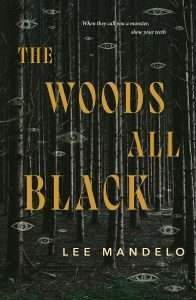 I’m slightly cheating here because I have already been sent an advance review copy. Out in March, Lee Mandelo’s latest, The Woods All Black, is a modern gothic masterpiece. Set in rural Appalachia in the 1930s and featuring two (non-passing) trans leads, this novella packs a punch. Mandelo’s evocative writing, literary style and a strong sense of the uncanny root this story in a small(minded) community. It looks at what makes villains and morality – and how they are affected by perspective. I haven’t been able to shut up about it since I read it.
I’m slightly cheating here because I have already been sent an advance review copy. Out in March, Lee Mandelo’s latest, The Woods All Black, is a modern gothic masterpiece. Set in rural Appalachia in the 1930s and featuring two (non-passing) trans leads, this novella packs a punch. Mandelo’s evocative writing, literary style and a strong sense of the uncanny root this story in a small(minded) community. It looks at what makes villains and morality – and how they are affected by perspective. I haven’t been able to shut up about it since I read it.
Leslie Bruin is assigned to the backwoods township of Spar Creek by the Frontier Nursing Service, under its usual mandate: vaccinate the flock, birth babies, and weather the judgements of churchy locals who look at him and see a failed woman. Forged in the fires of the Western Front and reborn in the cafes of Paris, Leslie believes he can handle whatever is thrown at him―but Spar Creek holds a darkness beyond his nightmares.
Something ugly festers within the local congregation, and its malice has focused on a young person they insist is an unruly tomboy who must be brought to heel. Violence is bubbling when Leslie arrives, ready to spill over, and he’ll have to act fast if he intends to be of use. But the hills enfolding Spar Creek have a mind of their own, and the woods are haunted in ways Leslie does not understand.
Read The Woods All Black by Lee MandeloThe Book That Broke The World by Mark LawrencePicked by John Mauro
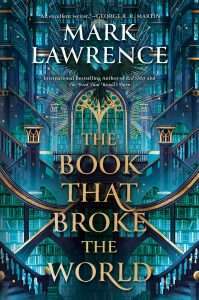 The ending of The Book That Wouldn’t Burn left me in tears, and I can’t wait to find out what happens next with Livira, Evar, and all my friends from Mark Lawrence’s new Library Trilogy. I am also eager to see how the larger plot evolves regarding King Oanold and the war over the Library, which parallels the epic struggle of humankind between knowledge and ignorance.
The ending of The Book That Wouldn’t Burn left me in tears, and I can’t wait to find out what happens next with Livira, Evar, and all my friends from Mark Lawrence’s new Library Trilogy. I am also eager to see how the larger plot evolves regarding King Oanold and the war over the Library, which parallels the epic struggle of humankind between knowledge and ignorance.
Read the full review for The Book that wouldn’t Burn here.
About the BookWe fight for the people we love. We fight for the ideas we want to be true.
Evar and Livira stand side by side and yet far beyond each other’s reach. Evar is forced to flee the library, driven before an implacable foe. Livira, trapped in a ghost world, has to recover her book if she’s to return to her life. While Evar’s journey leads him outside into the vastness of a world he’s never seen, Livira’s destination lies deep inside her own writing, where she must wrestle with her stories in order to reclaim the volume in which they were written.
And all the while, the library quietly weaves thread to thread, bringing the scattered elements of Livira’s old life – friends and foe alike – back together beneath new skies.
Long ago, a lie was told, and with the passing years it has grown and spread, a small push leading to a chain of desperate consequences. Now, as one edifice topples into the next with ever-growing violence, it threatens to break the world. The secret war that defines the library has chosen its champions and set them on the board. The time has come when they must fight for what they believe, or lose everything.
Read The Book That Broke The World by Mark LawrenceA Tempest of Tea by Hafsah FaizalPicked by Saberin C.
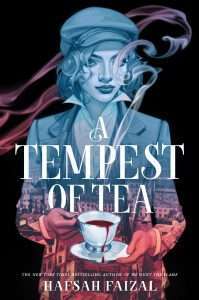 Heists, criminal masterminds, vampires and… tea? What is there not to look forward to? I’ve followed Hafsah Faizal’s writing career since her traditionally-published debut We Hunt The Flame and have been utterly in awe of her since. I cannot wait to see what else lays in her fantastical repertoire!
Heists, criminal masterminds, vampires and… tea? What is there not to look forward to? I’ve followed Hafsah Faizal’s writing career since her traditionally-published debut We Hunt The Flame and have been utterly in awe of her since. I cannot wait to see what else lays in her fantastical repertoire!
On the streets of White Roaring, Arthie Casimir is a criminal mastermind and collector of secrets. Her prestigious tearoom transforms into an illegal bloodhouse by night, catering to the vampires feared by society. But when her establishment is threatened, Arthie is forced to strike an unlikely deal with an alluring adversary to save it―she can’t do the job alone.
Calling on some of the city’s most skilled outcasts, Arthie hatches a plan to infiltrate the sinister, glittering vampire society known as the Athereum. But not everyone in her ragtag crew is on her side, and as the truth behind the heist unfolds, Arthie finds herself in the midst of a conspiracy that will threaten the world as she knows it. Dark, action-packed, and swoonworthy, this is Hafsah Faizal better than ever.
Read A Tempest of Tea by Hafsah FaizalHow to Become the Dark Lord and Die TryingPicked by Elizabeth Tabler
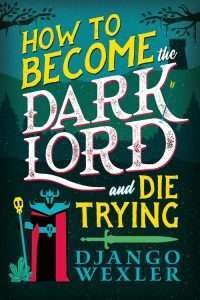 Honestly, this just sounds fun as hell. “A young woman stuck in a time loop tires of defending humanity from the Dark Lord and decides to become the Dark Lord herself.” I mean, firstly it is Wexler who is a master, and I love a good protagonist gone bad. 2024 is not lacking in glorious books coming out, Adrian Tchaikovsky has multiple books coming out and he could write a new take on the dictionary and I would line up on publish day to buy it. Also, Hannah Kaner has the second book in Godkiller series, Sunbringer. I am thinking it is going to be a gloriously busy reading year for me.
Honestly, this just sounds fun as hell. “A young woman stuck in a time loop tires of defending humanity from the Dark Lord and decides to become the Dark Lord herself.” I mean, firstly it is Wexler who is a master, and I love a good protagonist gone bad. 2024 is not lacking in glorious books coming out, Adrian Tchaikovsky has multiple books coming out and he could write a new take on the dictionary and I would line up on publish day to buy it. Also, Hannah Kaner has the second book in Godkiller series, Sunbringer. I am thinking it is going to be a gloriously busy reading year for me.
Davi has somehow managed to get herself trapped in a fantasy world – and not one full of rainbows and unicorns, but one packed with all manner of terrifying monsters and deadly magic.
Proper Lord of the Rings stuff. And, for reasons unknown, the humans of the Kingdom look to her for protection against the Dark Lord. To make matters worse, Davi’s stuck in a time loop. So every time she fails to defeat the Dark Lord (which is every time) she has to start over.
But Davi has a plan. What if instead of trying to defeat the Dark Lord . . . she becomes the Dark Lord instead?
What could possibly go wrong?
Read How to Become the Dark Lord (and Die Trying)The Storm Beneath the World by Michael R. Fletcher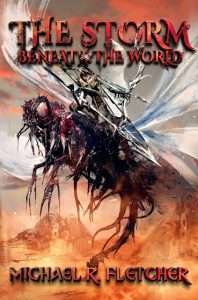 Fletcher has become renown as an author that grimdark fans love to read. His worlds are dark and gritty, his characters are as morally grey as they come (and generally hilarious), and his imagination is about as wild as any author out there plying their trade in the modern age. If you haven’t yet picked up Beyond Redemption and witnessed the magnificence that is the ending of that the Manifest Delusions world in A War to End All then you have missed out on one of the wildest, grungiest rides in modern fantasy. There isn’t a lot available about this book, but you can delve into an interview with Fletcher on Fantasy Book Critic.
Fletcher has become renown as an author that grimdark fans love to read. His worlds are dark and gritty, his characters are as morally grey as they come (and generally hilarious), and his imagination is about as wild as any author out there plying their trade in the modern age. If you haven’t yet picked up Beyond Redemption and witnessed the magnificence that is the ending of that the Manifest Delusions world in A War to End All then you have missed out on one of the wildest, grungiest rides in modern fantasy. There isn’t a lot available about this book, but you can delve into an interview with Fletcher on Fantasy Book Critic.
The Storm Beneath the World is a book that I cannot wait to get my hands on.
About the bookCursed by the gods, the insectile ashkaro live on flying islands travelling the eternal River of Days while a hellish firestorm devours the world below. Collected into queendoms, the higher caste brights live in the luxurious windward rain-forest while the servile dulls scrape out a desperate existence in the leeward desert.
Conflicts escalate between two neighbouring queendoms. Where Nysh embraces modern ideals of equality and independence, Yil honours the Fallen Goddess by enslaving their neighbours and maintaining traditional castes.
In preparation for the imminent war, Nysh sends ashkaro youths with dangerous Talents to secret schools, training them as assassins and spies. Joh, a dull male with a Talent for suggestion, and Ahk, a bright female with a Talent for stealth, are torn from their families and thrown into the academy. The two naively believe that the biggest threat comes from the other students, not realizing the war has already begun.
United in purpose, divided by caste, they can only save the island from the Mad Queen by working together.
Read The Storm Beneath the World by Michael R. FletcherRelics of Ruin by Erin M EvansEditor’s Pick
Empire of Exiles 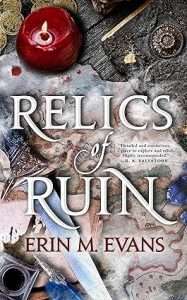 left unanswered questions and we are all too eager for answers. Relics of Ruin continues the Books of the Usurper series with new mysteries to uncover. Erin M Evans’s ensemble of characters, with their moral ambiguity, sparked our curiosity in the first book. Their choices are bound to still haunt them.
left unanswered questions and we are all too eager for answers. Relics of Ruin continues the Books of the Usurper series with new mysteries to uncover. Erin M Evans’s ensemble of characters, with their moral ambiguity, sparked our curiosity in the first book. Their choices are bound to still haunt them.
The conspiracy at the heart of the empire has been revealed. The Archivists played a key role in solving a brutal murder and uncovering one of the empire’s longest kept secrets. Now, what’s left in its wake are a series of unearthed artifacts, one shaken city, and the shocking truth not dared spoken aloud.
Just as the empire has begun to regain normalcy, another mystery unveils itself when a stolen ancient relic is found. Only no one knew that it was missing from its sacred vault in the first place. And now that the real one has been recovered, who replaced it with a fake?
With Quill and Amadea at the heart of another mystery, they will need to quickly follow the clues that all lead back to this new relic.
Because all the while, an old enemy is gathering strength beyond the Salt Wall and the Archivists might come to find there’s nowhere left for them to go but over.
Read Relics of Ruin by Erin M EvansThe Butcher of the Forest by Premee MohamedPicked by Carrie Chi
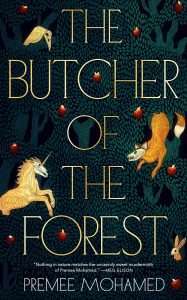 A sinister forest filled with monsters and black magic- I’m running right in. Butcher of the Forest tangles fantasy and horror in this promising dark fairy tale. While Premee Mohamed is a new name for me, her work has won numerous awards including Nebula, World Fantasy, and Aurora.
A sinister forest filled with monsters and black magic- I’m running right in. Butcher of the Forest tangles fantasy and horror in this promising dark fairy tale. While Premee Mohamed is a new name for me, her work has won numerous awards including Nebula, World Fantasy, and Aurora.
At the northern edge of a land ruled by a merciless foreign tyrant lies a wild, forbidden forest ruled by powerful magic.
Veris Thorn―the only one to ever enter the forest and survive―is forced to go back inside to retrieve the tyrant’s missing children. Inside await traps and trickery, ancient monsters, and hauntings of the past.
One day is all Veris is afforded. One misstep will cost everything.
Read The Butcher of the Forest by Premee MohamedBook 10 of the Bernicia Chronicles by Matthew HarffyPicked by Aaron Jones
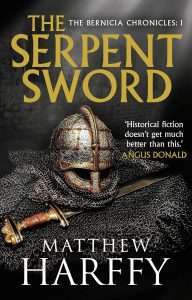 Following the Northumbrian lord, Beobrand heads to the Holy City of Rome for more medieval adventures following this year’s fantastic Forest of Foes. Beobrand’s journey of growth and warfare has been a fascinating one so far and fans of historical fiction will be eager to snap up this next instalment from a master of the genre.
Following the Northumbrian lord, Beobrand heads to the Holy City of Rome for more medieval adventures following this year’s fantastic Forest of Foes. Beobrand’s journey of growth and warfare has been a fascinating one so far and fans of historical fiction will be eager to snap up this next instalment from a master of the genre.
Read the interview with Matthew Harffy here.
About the seriesAD 633, Anglo-Saxon Britain: Beobrand is a young man with a shadowy past. As an outsider in the kingdom of Bernicia, he is compelled to join his brother, Octa, as a warrior in the household of King Edwin. He must learn to fight with sword and shield to defend the war-ravaged kingdoms of Northumbria. In a period of great upheaval for Dark Age Britain, all he finds is death and war. Men and women strive to seize control of their destinies in a time of despair, and the land is rife with danger as warlords vie for supremacy and dominion. Among the blood and the betrayals, Beobrand learns of his brother’s near-certain murder. Inexperienced but ruthless, Beobrand must form his own allegiances and learn to fight as a warrior with sword and shield. Driven by a desire for vengeance and a relentless pursuit of his enemies, he faces challenges which transform him from a boy to a man who stands strong in the clamor and gore of the shieldwall. As he closes in on his kin’s slayer, can Beobrand mete out the retribution he craves without sacrificing his honor . . . or even his soul?
Read book one of the Bernicia Chronicles by Matthew HarffyThe Dead Cat Tail Assassins by P. Djèlí ClarkEditor’s Pick
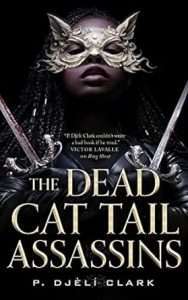 Known for his punchy stories and incredible worldbuilding, the author of A Master of Djinn is on the short list of my TBR. His new tale promises to deliver what I look for in any assassin story- impossible stakes and compelling characters. P. Djèlí Clark brightens the deal with its Gaslamp setting.
Known for his punchy stories and incredible worldbuilding, the author of A Master of Djinn is on the short list of my TBR. His new tale promises to deliver what I look for in any assassin story- impossible stakes and compelling characters. P. Djèlí Clark brightens the deal with its Gaslamp setting.
Eveen the Eviscerator is skilled, discreet, professional, and here for your most pressing needs in the ancient city of Tal Abisi. Her guild is strong, her blades are sharp, and her rules are simple. Those sworn to the Matron of Assassins—resurrected, deadly, wiped of their memories—have only three unbreakable vows.
First, the contract must be just. That’s above Eveen’s pay grade.
Second, even the most powerful assassin may only kill the contracted. Eveen’s a professional. She’s never missed her mark.
The third and the simplest: once you accept a job, you must carry it out. And if you stray? A final death would be a mercy. When the Festival of the Clockwork King turns the city upside down, Eveen’s newest mission brings her face-to-face with a past she isn’t supposed to remember and a vow she can’t forget.
Read The Dead Cat Tail Assassins by P. Djèlí ClarkThe post The Most Anticipated Dark Fantasy and Sci Fi Books of 2024 appeared first on Grimdark Magazine.
The Most Anticipated Dark Sci Fi and Fantasy Books of 2024
Last Updated on December 26, 2023
2023 brought in a good haul of dark fantasy and science fiction books with many of our favorite authors dominating the scene with their releases (check out our favourites from 2023). As 2024 creeps up, the party isn’t slowing down. Be in the know as the GdM team rallied together to discuss the books we are most excited for. It is time to break out the good ol’ TBR list for GdM’s most anticipated SFF books for 2024.
Empire of the Damned by Jay KristoffPicked by Fiona Denton
 Readers with a long memory may recall that this sequel to 2021s Empire of the Vampire was also my pick for 2023 when I was desperately hoping the then untitled novel would be released in late 2023. I was wrong and I’m still waiting, but that’s okay. Absence makes the heart grow fonder, good things come to those who wait, etcetera etcetera. Empire of the Damned will have vampires, silversaints, the best sweary insults, battles, blood, and probably the odd potato vodka. I’ve got it on predordered in physical and audio (narrated by the awesome Damian Lynch) and I cannot wait to get my hands on it. After all, ‘a life without books is a life not lived’.
Readers with a long memory may recall that this sequel to 2021s Empire of the Vampire was also my pick for 2023 when I was desperately hoping the then untitled novel would be released in late 2023. I was wrong and I’m still waiting, but that’s okay. Absence makes the heart grow fonder, good things come to those who wait, etcetera etcetera. Empire of the Damned will have vampires, silversaints, the best sweary insults, battles, blood, and probably the odd potato vodka. I’ve got it on predordered in physical and audio (narrated by the awesome Damian Lynch) and I cannot wait to get my hands on it. After all, ‘a life without books is a life not lived’.
From holy cup comes holy light;
The faithful hands sets world aright.
And in the Seven Martyrs’ sight,
Mere man shall end this endless night.
Gabriel de León has saved the Holy Grail from death, but his chance to end the endless night is lost. Drawn into an uneasy alliance with the mysterious vampire Liathe, Gabriel must now deliver the Grail to ancients of the Blood Esani, and learn the truth of how Daysdeath might be finally undone.
But the Last Silversaint faces peril, within and without. Pursued by terrors of the Blood Voss, drawn into warfare between the Blood Dyvok and duskdancers of the frozen Highlands, and ravaged by his own rising bloodlust, Gabriel may not survive to see the Grail learn her truth.
And that truth may be too awful for any to imagine.
Read Empire of the Damned by Jay KristoffThe End and the Death: Volume III by Dan AbenettPicked by Chris Napper
 The End and the Death Part 1 was so nearly my book of the year, but let’s be honest it’s all about the final climax. The End and the Death part 3 is a book I’ve been looking forward to since I was first exposed to Warhammer 40k 33 or so years ago, with the full version of the Emperor vs Horus now added to by all the themes and threads added by the Horus Heresy series over 63 books and 17 years. Dan Abnett is rightly considered as one of if not the best writer in Black Library’s stable and I trust him to stick the landing.
The End and the Death Part 1 was so nearly my book of the year, but let’s be honest it’s all about the final climax. The End and the Death part 3 is a book I’ve been looking forward to since I was first exposed to Warhammer 40k 33 or so years ago, with the full version of the Emperor vs Horus now added to by all the themes and threads added by the Horus Heresy series over 63 books and 17 years. Dan Abnett is rightly considered as one of if not the best writer in Black Library’s stable and I trust him to stick the landing.
The Great Angel, Sanguinius, lies slain at his brother’s hand.
Terra burns as reality itself unravels and the greatest bastion of civilisation teeters on the brink of annihilation.
Desperate defenders gather, banding against the rabid traitor hordes. The Hollow Mountain, host to the pilgrims of Euphrati Keeler, is one of the last redoubts, held by the Dark Angels while the unclean host of Typhus lays siege. Malcador the Sigillite sits ablaze on the Golden Throne, trying to buy his master more time. But time is running out…
Guilliman races across the stars to reinforce the Throneworld. Will he return to ashes, where a Warmaster of Chaos has ascended to godhood, or will the Emperor have triumphed? And at what cost?
It all comes down to one final, climactic confrontation: the Emperor versus Horus. The father against the son.
Read The End and the Death: Volume III by Dan AbenettGhost Station by S.A BarnesEditor’s Pick
 S.A Barnes filled the night sky with haunted delusions in Dead Silence. She reaches a new height with her latest space horror novel. While Dead Silence focused on a mysterious lost spaceship, the secrets in Ghost Station are spread throughout a planet. Space exploration is paved by nightmares in Ghost Station. Perhaps space isn’t so empty after all.
S.A Barnes filled the night sky with haunted delusions in Dead Silence. She reaches a new height with her latest space horror novel. While Dead Silence focused on a mysterious lost spaceship, the secrets in Ghost Station are spread throughout a planet. Space exploration is paved by nightmares in Ghost Station. Perhaps space isn’t so empty after all.
Space exploration can be lonely and isolating.
Psychologist Dr. Ophelia Bray has dedicated her life to the study and prevention of ERS—a space-based condition most famous for a case that resulted in the brutal murders of twenty-nine people. When she’s assigned to a small exploration crew, she’s eager to make a difference. But as they begin to establish residency on an abandoned planet, it becomes clear that crew is hiding something.
While Ophelia focuses on her new role, her crewmates are far more interested in investigating the eerie, ancient planet and unraveling the mystery behind the previous colonizer’s hasty departure than opening up to her.
That is, until their pilot is discovered gruesomely murdered. Is this Ophelia’s worst nightmare starting—a wave of violence and mental deterioration from ERS? Or is it something more sinister?
Terrified that history will repeat itself, Ophelia and the crew must work together to figure out what’s happening. But trust is hard to come by…and the crew isn’t the only one keeping secrets.
Read Ghost Station by S.A BarnesThe Woods All Black by Lee MandeloPicked by Fabienne Schwizer
 I’m slightly cheating here because I have already been sent an advance review copy. Out in March, Lee Mandelo’s latest, The Woods All Black, is a modern gothic masterpiece. Set in rural Appalachia in the 1930s and featuring two (non-passing) trans leads, this novella packs a punch. Mandelo’s evocative writing, literary style and a strong sense of the uncanny root this story in a small(minded) community. It looks at what makes villains and morality – and how they are affected by perspective. I haven’t been able to shut up about it since I read it.
I’m slightly cheating here because I have already been sent an advance review copy. Out in March, Lee Mandelo’s latest, The Woods All Black, is a modern gothic masterpiece. Set in rural Appalachia in the 1930s and featuring two (non-passing) trans leads, this novella packs a punch. Mandelo’s evocative writing, literary style and a strong sense of the uncanny root this story in a small(minded) community. It looks at what makes villains and morality – and how they are affected by perspective. I haven’t been able to shut up about it since I read it.
Leslie Bruin is assigned to the backwoods township of Spar Creek by the Frontier Nursing Service, under its usual mandate: vaccinate the flock, birth babies, and weather the judgements of churchy locals who look at him and see a failed woman. Forged in the fires of the Western Front and reborn in the cafes of Paris, Leslie believes he can handle whatever is thrown at him―but Spar Creek holds a darkness beyond his nightmares.
Something ugly festers within the local congregation, and its malice has focused on a young person they insist is an unruly tomboy who must be brought to heel. Violence is bubbling when Leslie arrives, ready to spill over, and he’ll have to act fast if he intends to be of use. But the hills enfolding Spar Creek have a mind of their own, and the woods are haunted in ways Leslie does not understand.
Read The Woods All Black by Lee MandeloThe Book That Broke The World by Mark LawrencePicked by John Mauro
 The ending of The Book That Wouldn’t Burn left me in tears, and I can’t wait to find out what happens next with Livira, Evar, and all my friends from Mark Lawrence’s new Library Trilogy. I am also eager to see how the larger plot evolves regarding King Oanold and the war over the Library, which parallels the epic struggle of humankind between knowledge and ignorance.
The ending of The Book That Wouldn’t Burn left me in tears, and I can’t wait to find out what happens next with Livira, Evar, and all my friends from Mark Lawrence’s new Library Trilogy. I am also eager to see how the larger plot evolves regarding King Oanold and the war over the Library, which parallels the epic struggle of humankind between knowledge and ignorance.
Read the full review for The Book that wouldn’t Burn here.
About the BookWe fight for the people we love. We fight for the ideas we want to be true.
Evar and Livira stand side by side and yet far beyond each other’s reach. Evar is forced to flee the library, driven before an implacable foe. Livira, trapped in a ghost world, has to recover her book if she’s to return to her life. While Evar’s journey leads him outside into the vastness of a world he’s never seen, Livira’s destination lies deep inside her own writing, where she must wrestle with her stories in order to reclaim the volume in which they were written.
And all the while, the library quietly weaves thread to thread, bringing the scattered elements of Livira’s old life – friends and foe alike – back together beneath new skies.
Long ago, a lie was told, and with the passing years it has grown and spread, a small push leading to a chain of desperate consequences. Now, as one edifice topples into the next with ever-growing violence, it threatens to break the world. The secret war that defines the library has chosen its champions and set them on the board. The time has come when they must fight for what they believe, or lose everything.
Read The Book That Broke The World by Mark LawrenceA Tempest of Tea by Hafsah FaizalPicked by Saberin C.
 Heists, criminal masterminds, vampires and… tea? What is there not to look forward to? I’ve followed Hafsah Faizal’s writing career since her traditionally-published debut We Hunt The Flame and have been utterly in awe of her since. I cannot wait to see what else lays in her fantastical repertoire!
Heists, criminal masterminds, vampires and… tea? What is there not to look forward to? I’ve followed Hafsah Faizal’s writing career since her traditionally-published debut We Hunt The Flame and have been utterly in awe of her since. I cannot wait to see what else lays in her fantastical repertoire!
On the streets of White Roaring, Arthie Casimir is a criminal mastermind and collector of secrets. Her prestigious tearoom transforms into an illegal bloodhouse by night, catering to the vampires feared by society. But when her establishment is threatened, Arthie is forced to strike an unlikely deal with an alluring adversary to save it―she can’t do the job alone.
Calling on some of the city’s most skilled outcasts, Arthie hatches a plan to infiltrate the sinister, glittering vampire society known as the Athereum. But not everyone in her ragtag crew is on her side, and as the truth behind the heist unfolds, Arthie finds herself in the midst of a conspiracy that will threaten the world as she knows it. Dark, action-packed, and swoonworthy, this is Hafsah Faizal better than ever.
Read A Tempest of Tea by Hafsah FaizalHow to Become the Dark Lord and Die TryingPicked by Elizabeth Tabler
 Honestly, this just sounds fun as hell. “A young woman stuck in a time loop tires of defending humanity from the Dark Lord and decides to become the Dark Lord herself.” I mean, firstly it is Wexler who is a master, and I love a good protagonist gone bad. 2024 is not lacking in glorious books coming out, Adrian Tchaikovsky has multiple books coming out and he could write a new take on the dictionary and I would line up on publish day to buy it. Also, Hannah Kaner has the second book in Godkiller series, Sunbringer. I am thinking it is going to be a gloriously busy reading year for me.
Honestly, this just sounds fun as hell. “A young woman stuck in a time loop tires of defending humanity from the Dark Lord and decides to become the Dark Lord herself.” I mean, firstly it is Wexler who is a master, and I love a good protagonist gone bad. 2024 is not lacking in glorious books coming out, Adrian Tchaikovsky has multiple books coming out and he could write a new take on the dictionary and I would line up on publish day to buy it. Also, Hannah Kaner has the second book in Godkiller series, Sunbringer. I am thinking it is going to be a gloriously busy reading year for me.
Davi has somehow managed to get herself trapped in a fantasy world – and not one full of rainbows and unicorns, but one packed with all manner of terrifying monsters and deadly magic.
Proper Lord of the Rings stuff. And, for reasons unknown, the humans of the Kingdom look to her for protection against the Dark Lord. To make matters worse, Davi’s stuck in a time loop. So every time she fails to defeat the Dark Lord (which is every time) she has to start over.
But Davi has a plan. What if instead of trying to defeat the Dark Lord . . . she becomes the Dark Lord instead?
What could possibly go wrong?
Read How to Become the Dark Lord (and Die Trying)The Storm Beneath the World by Michael R. Fletcher Fletcher has become renown as an author that grimdark fans love to read. His worlds are dark and gritty, his characters are as morally grey as they come (and generally hilarious), and his imagination is about as wild as any author out there plying their trade in the modern age. If you haven’t yet picked up Beyond Redemption and witnessed the magnificence that is the ending of that the Manifest Delusions world in A War to End All then you have missed out on one of the wildest, grungiest rides in modern fantasy. There isn’t a lot available about this book, but you can delve into an interview with Fletcher on Fantasy Book Critic.
Fletcher has become renown as an author that grimdark fans love to read. His worlds are dark and gritty, his characters are as morally grey as they come (and generally hilarious), and his imagination is about as wild as any author out there plying their trade in the modern age. If you haven’t yet picked up Beyond Redemption and witnessed the magnificence that is the ending of that the Manifest Delusions world in A War to End All then you have missed out on one of the wildest, grungiest rides in modern fantasy. There isn’t a lot available about this book, but you can delve into an interview with Fletcher on Fantasy Book Critic.
The Storm Beneath the World is a book that I cannot wait to get my hands on.
About the bookCursed by the gods, the insectile ashkaro live on flying islands travelling the eternal River of Days while a hellish firestorm devours the world below. Collected into queendoms, the higher caste brights live in the luxurious windward rain-forest while the servile dulls scrape out a desperate existence in the leeward desert.
Conflicts escalate between two neighbouring queendoms. Where Nysh embraces modern ideals of equality and independence, Yil honours the Fallen Goddess by enslaving their neighbours and maintaining traditional castes.
In preparation for the imminent war, Nysh sends ashkaro youths with dangerous Talents to secret schools, training them as assassins and spies. Joh, a dull male with a Talent for suggestion, and Ahk, a bright female with a Talent for stealth, are torn from their families and thrown into the academy. The two naively believe that the biggest threat comes from the other students, not realizing the war has already begun.
United in purpose, divided by caste, they can only save the island from the Mad Queen by working together.
Read The Storm Beneath the World by Michael R. FletcherRelics of Ruin by Erin M EvansEditor’s Pick
Empire of Exiles  left unanswered questions and we are all too eager for answers. Relics of Ruin continues the Books of the Usurper series with new mysteries to uncover. Erin M Evans’s ensemble of characters, with their moral ambiguity, sparked our curiosity in the first book. Their choices are bound to still haunt them.
left unanswered questions and we are all too eager for answers. Relics of Ruin continues the Books of the Usurper series with new mysteries to uncover. Erin M Evans’s ensemble of characters, with their moral ambiguity, sparked our curiosity in the first book. Their choices are bound to still haunt them.
The conspiracy at the heart of the empire has been revealed. The Archivists played a key role in solving a brutal murder and uncovering one of the empire’s longest kept secrets. Now, what’s left in its wake are a series of unearthed artifacts, one shaken city, and the shocking truth not dared spoken aloud.
Just as the empire has begun to regain normalcy, another mystery unveils itself when a stolen ancient relic is found. Only no one knew that it was missing from its sacred vault in the first place. And now that the real one has been recovered, who replaced it with a fake?
With Quill and Amadea at the heart of another mystery, they will need to quickly follow the clues that all lead back to this new relic.
Because all the while, an old enemy is gathering strength beyond the Salt Wall and the Archivists might come to find there’s nowhere left for them to go but over.
Read Relics of Ruin by Erin M EvansThe Butcher of the Forest by Premee MohamedPicked by Carrie Chi
 A sinister forest filled with monsters and black magic- I’m running right in. Butcher of the Forest tangles fantasy and horror in this promising dark fairy tale. While Premee Mohamed is a new name for me, her work has won numerous awards including Nebula, World Fantasy, and Aurora.
A sinister forest filled with monsters and black magic- I’m running right in. Butcher of the Forest tangles fantasy and horror in this promising dark fairy tale. While Premee Mohamed is a new name for me, her work has won numerous awards including Nebula, World Fantasy, and Aurora.
At the northern edge of a land ruled by a merciless foreign tyrant lies a wild, forbidden forest ruled by powerful magic.
Veris Thorn―the only one to ever enter the forest and survive―is forced to go back inside to retrieve the tyrant’s missing children. Inside await traps and trickery, ancient monsters, and hauntings of the past.
One day is all Veris is afforded. One misstep will cost everything.
Read The Butcher of the Forest by Premee MohamedBook 10 of the Bernicia Chronicles by Matthew HarffyPicked by Aaron Jones
 Following the Northumbrian lord, Beobrand heads to the Holy City of Rome for more medieval adventures following this year’s fantastic Forest of Foes. Beobrand’s journey of growth and warfare has been a fascinating one so far and fans of historical fiction will be eager to snap up this next instalment from a master of the genre.
Following the Northumbrian lord, Beobrand heads to the Holy City of Rome for more medieval adventures following this year’s fantastic Forest of Foes. Beobrand’s journey of growth and warfare has been a fascinating one so far and fans of historical fiction will be eager to snap up this next instalment from a master of the genre.
Read the interview with Matthew Harffy here.
About the seriesAD 633, Anglo-Saxon Britain: Beobrand is a young man with a shadowy past. As an outsider in the kingdom of Bernicia, he is compelled to join his brother, Octa, as a warrior in the household of King Edwin. He must learn to fight with sword and shield to defend the war-ravaged kingdoms of Northumbria. In a period of great upheaval for Dark Age Britain, all he finds is death and war. Men and women strive to seize control of their destinies in a time of despair, and the land is rife with danger as warlords vie for supremacy and dominion. Among the blood and the betrayals, Beobrand learns of his brother’s near-certain murder. Inexperienced but ruthless, Beobrand must form his own allegiances and learn to fight as a warrior with sword and shield. Driven by a desire for vengeance and a relentless pursuit of his enemies, he faces challenges which transform him from a boy to a man who stands strong in the clamor and gore of the shieldwall. As he closes in on his kin’s slayer, can Beobrand mete out the retribution he craves without sacrificing his honor . . . or even his soul?
Read book one of the Bernicia Chronicles by Matthew HarffyThe Dead Cat Tail Assassins by P. Djèlí ClarkEditor’s Pick
 Known for his punchy stories and incredible worldbuilding, the author of A Master of Djinn is on the short list of my TBR. His new tale promises to deliver what I look for in any assassin story- impossible stakes and compelling characters. P. Djèlí Clark brightens the deal with its Gaslamp setting.
Known for his punchy stories and incredible worldbuilding, the author of A Master of Djinn is on the short list of my TBR. His new tale promises to deliver what I look for in any assassin story- impossible stakes and compelling characters. P. Djèlí Clark brightens the deal with its Gaslamp setting.
Eveen the Eviscerator is skilled, discreet, professional, and here for your most pressing needs in the ancient city of Tal Abisi. Her guild is strong, her blades are sharp, and her rules are simple. Those sworn to the Matron of Assassins—resurrected, deadly, wiped of their memories—have only three unbreakable vows.
First, the contract must be just. That’s above Eveen’s pay grade.
Second, even the most powerful assassin may only kill the contracted. Eveen’s a professional. She’s never missed her mark.
The third and the simplest: once you accept a job, you must carry it out. And if you stray? A final death would be a mercy. When the Festival of the Clockwork King turns the city upside down, Eveen’s newest mission brings her face-to-face with a past she isn’t supposed to remember and a vow she can’t forget.
Read The Dead Cat Tail Assassins by P. Djèlí ClarkThe post The Most Anticipated Dark Sci Fi and Fantasy Books of 2024 appeared first on Grimdark Magazine.
December 24, 2023
REVIEW: Blue Eye Samurai
Blue Eye Samurai is the latest animated effort from Netflix and I feel confident in saying it is the best one yet. Whilst a Western production, the Japanese setting and style will have anime fans loving every beautiful scene as they follow the tale of Mizu, a biracial outcast in a Edo-period Japan where foreigners are not allowed onto the isolated island.
Blue Eye Samurai is a fresh story that delivers a tale that may have elements of familiarity but they are dished up in a way that feels innovative and new. There are clear homages to the work of Akira Kurosawa blended with the brutality of Takashi Miike (go and watch 13 Assassins). Mizu is born a female but raised as a boy in a world with strict gender roles. Born to a struggling mother and fathered by one of only four white men on the island, Mizu’s tale is one of revenge as she attempts to track down her father and kill him for the sins of the past. The childhood trauma plays a big part in shaping Mizu and placing her on the path of revenge fans of grimdark will love to cheer on the deadly samurai as she stops at nothing to get what she wants. Innocents die, blood is spilled, and a path of destruction is created with no thought of anyone else as Mizu goes on her journey, at times accompanied by characters attempting to shine a little light in her world of darkness. It’s a cruel world that Mizu lives in and one of the best things about Blue Eye Samurai is the way in which it shows how characters deal with their trauma and difficulties. Ringo battles through life with a smile on his face, not letting the fact that he was born with no hands and beaten by his father stop in his way of helping others to greatness. Akemi is seemingly born with it all, a princess, but she struggles with the tight boundaries placed on her in her role because of her gender and she fights to break free at any cost. All the characters in the show have their own paths and their own issues to deal with and the way they all interweave with the main story is a joy to behold and a sign of the great writing across the eight brilliant episodes.
Blue Eye Samurai doesn’t shy away from the darker sides of the world. Brutal violence, racism, unique sexual tendencies, prostitution, drug abuse. This is a heavy show that deals with the darkness of humanity broken up by moments of levity. Each episode builds so well upon the last as the story slowly unravels. Episode 5 in particular had an impact on me with its unique style showcasing a part of Mizu’s backstory. It uses a Japanese puppet show in parts and is able to weave separate tales together in a stunning and beautiful piece of storytelling that left my jaw on the floor by the end. Blue Eye Samurai gives each character a reason for doing what they do and this is so important as the violence continues with each episode. There is a lot of darkness in the series but it makes those moments of light shine brighter for it when they do shine through the cracks.
Better than Cyberpunk and Castlevania (I loved them both) and at least on par with Arcane. Blue Eye Samurai is one of the best stories on Netflix, animated or otherwise. Beautiful animation mixed with a perfectly paced story and impeccable voice acting, this is a highlight of 2023 for me. Brutal, beautiful, and brilliant in equal measures. Blue Eye Samurai is incredible. Bring on season two!
The post REVIEW: Blue Eye Samurai appeared first on Grimdark Magazine.
REVIEW: Rebel Moon: Part One – A Child of Fire
Last Updated on December 25, 2023
In Rebel Moon: Part One – A Child of Fire, a mysterious farmer with a dark past has settled in a small frontier village. Kora is as happy as somebody like her can be, tilling the fields, celebrating the farming life wins, and just existing. Then, an Imperial warship arrives and decides to take all their grain. They have nine weeks to harvest, and then they’ll be left to starve—or, they can fight.
 Rebel Moon: Part One – A Child of Fire has incredibly strong Star Wars and Warhammer 40k vibes crossed with a Magnificent Seven story arc, and if the script and delivery had of been a bit (… a fair bit, actually) better, the visuals and grit would have landed awesomely. Helmed by Zack Snyder and with a cast including Anthony Hopkins, Sofia Boutella, Ed Skrein, Charlie Hunnam, Rhian Rees, Djimon Honsou, and even Carey Elwes, the talent was certainly there to deliver an amazing script. But the script wasn’t there, nor was any form of character progression for anyone but the protagonist, and so the relatively simple, tried and tested storyline didn’t really land at all with plenty of infodumpy backstory unloads, weird stilted conversations, and visuals trying (and not always succeeding) to patch over these problems.
Rebel Moon: Part One – A Child of Fire has incredibly strong Star Wars and Warhammer 40k vibes crossed with a Magnificent Seven story arc, and if the script and delivery had of been a bit (… a fair bit, actually) better, the visuals and grit would have landed awesomely. Helmed by Zack Snyder and with a cast including Anthony Hopkins, Sofia Boutella, Ed Skrein, Charlie Hunnam, Rhian Rees, Djimon Honsou, and even Carey Elwes, the talent was certainly there to deliver an amazing script. But the script wasn’t there, nor was any form of character progression for anyone but the protagonist, and so the relatively simple, tried and tested storyline didn’t really land at all with plenty of infodumpy backstory unloads, weird stilted conversations, and visuals trying (and not always succeeding) to patch over these problems.
Not to flog a dead horse, but I need to get down to the line-by-line level here. There were just so many very weird character decisions. A warship where the armoured glass is shattered by a spear. Forgetting to turn your power swords on during single combat. The usual not killing your foes when you have the most obvious and easy chance (and probably only need the character’s head to prove you killed that person). Throwing away your weapon right when you need it. Honestly, if I write all of these down—one weird choice per sentence—it would be longer than the rest of this post.
Just to flog that dead horse a little bit longer: I think writers Zack Snyder, Kurt Johnstad, and Shay Hatten have a bit to answer for here, and Snyder as director probably has an even longer list of hard questions to work through. The three writers have worked together before and delivered much better outcomes with 300 (Snyder and Johnstad) and Army of the Dead (Snyder and Hatten) being very watchable, so I’m not sure what’s happened here. I can only hope the second movie in this duology, Rebel Moon: Part Two – The Scargiver lands better, and perhaps there is a director’s cut of Rebel Moon: Part One – A Child of Fire to deliver a better story and better secondary character progression.
Amongst my frustrations with Rebel Moon: Part One – A Child of Fire, I definitely feel there were some positives. There were some really cool action scenes (especially tbe battle scenes). The visuals at times were absolutely stunning (though, bizarrely, in a few scenes it felt like they ran out of money and used the CGI tools from Starship Troopers 2). The sets and costumes were put together brilliantly. There was some definite cool factor where for moments I could could forget about the rest. There is a feeling of a much, much larger universe out there, just waiting for us to explore it, with plenty of factions and people to invest in. And they have some actors who are are absolutely capable of delivering great stories in a way we can all invest in.
Rebel Moon: Part One – A Child of Fire is one of those sci fi movies that should have been amazing. They nailed the cool factor, had a serviceable overarching story that was simple and could have worked, had tried and tested talent from other epic SF and action movies to deliver it. However, in the end this film really stumbled in delivering a story that was good enough to carry the grit and harshness of their world. Rebel Moon: Part One – A Child of Fire should have been the beginnings of a competitor (with a 2-3 year head start) to the Warhammer Amazon world being led by Henry Cavill (latest update on that project as of December ’23, here). But in the end, it’s just exactly what I hope Cavill’s Warhamazon doesn’t turn out to be: the feel and the grit and the spectacle are there, but the soul and the heart of it are missing.
The post REVIEW: Rebel Moon: Part One – A Child of Fire appeared first on Grimdark Magazine.



